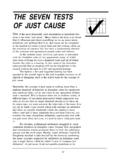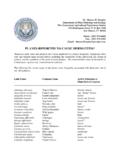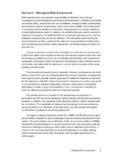Transcription of Ototoxic Medications - Northern Virginia Resource Center
1 Northern Virginia Resource Center for Deaf and Hard of Hearing Persons 3951 Pender Drive, Suite 130 Fairfax, VA 22030 703-352-9055 (V) 703-352-9056 (TTY) 703-352-9058 (FAX) Ototoxic Medications Copyright 10/2010 by Northern Virginia Resource Center for Deaf and Hard of Hearing Persons. Reproduction in whole or in part is prohibited without written permission. Antibiotics aminoglycosides - amikacin (Amakin) - gentamycin (Garamycin) - kanamycin (Kantrex) - neomycin (Found in many over-the-counter antibiotic ointments) - netilmicin (Netromycin) - streptomycin - tobramycin (Nebcin) (Of particular interest is that topical ear drop Medications containing gentamycin or neomycin do not appear to be Ototoxic in humans unless the tympanic membrane (ear drum) is perforated.)
2 When a solution of an aminoglycoside antibiotic is used on the skin together with an aminoglycoside antibiotic used intravenously, there is a risk of an increase of the Ototoxic effect, especially if the solution is used on a wound that is open or raw, or if the patient has underlying kidney damage. Neomycin is the drug that is most toxic to the structure involved in hearing, the cochlea, so it is recommended for topical use only. But even topical therapy has resulted in hearing loss when large areas were treated which allowed for large amounts of the drug to be absorbed into the body. Hearing loss caused by this class of antibiotics is usually permanent.) erythromycin - (EES) - (E-mycin) - (Ilosone) - (Eryc) - (Pediazole) - (Biaxin) - (Zithromax) (Usually Ototoxic when given in intravenous doses of 2-4 grams per 24 hours, especially if there is underlying kidney failure.
3 Vancomycin (Vancocin) (Similar to aminoglycosides in that it may be Ototoxic when used intravenously in life-threatening infections. The fact that aminoglycosides and vancomycin are often used together intravenously when treating life-threatening infections further exaggerates the problem.) minocycline (Minocin) (Similar to erythromycin) polymixin B & amphotericin B (Antifungal preparations) capreomycin (Capestat) (Anti-tuberculosis medication ) Chemotherapeutic Agents bleomycine (Blenoxane) bromocriptine (Parlodel) carboplatinum (Carboplatin) cisplatin (Platinol) methotrexate (Rheumatrex) nitrogen mustard (Mustargen) vinblastin (Velban) vincristine (Oncovin) (The Ototoxic effects can be minimized by care-fully monitoring blood levels.)
4 Salicylates aspirin and aspirin-containing products salicylagtes and methylsalicylates (linaments) (Toxic effects appear to be dose related and are almost always reversible once Medications are discontinued.) The following lists of Medications have been known to cause hearing loss or tinnitus in some people or exacerbate an existing hearing problem. Usually this problem will only be caused by exceeding the recommended dosage. Be sure to consult with your medical professional if you are unsure of your drug s ototoxicity or if you experience any changes in your hearing. Although there are times when the drugs can cause permanent damage, some hearing problems are reversible when the drug is discontinued. Drugs That Can Cause Hearing Loss 2 Diuretics bendroflumethazide (Corzide) bumetadine (Bumex) chlor-thalidone (Tenoretic) ethacrynic acid (Edecrin) furosemide (Lasix) (These are usually Ototoxic when given intravenously for acute kidney failure, acute hypertensive crisis, or acute pulmonary edema/congestive heart failure.)
5 Rare cases of ototoxicity have been found when these Medications are taken orally in high doses by people with chronic kidney disease.) Quinine chloroquine phosphate (Aralen) quinacrine hydrochloride (Atabrine) quinine sulfate (Quinam)(The Ototoxic effects are very similar to those of aspirin.) Mucosal Protectant misoprostol (Cytotec)Narcotic Analgesics hydrocodone (Lorcet, Vicodin)Antibiotics aminoglycosides (see previous section) amphotericin B chloramphenicol (Chloromycetin) minocycline (Monocin) polymyxine B sulfonamides (Septra, Bactrim) vancomycin (Vancocin)Cardiac Medications celiprolol flecainide (Tambocar) lidocaine metoprolol (Lopressor) procainamide (Pronestyl) propranolol (Inderal) quinidine (Quinaglute, Quiniedex)Vapors, Solvents cyclohexane dichloromethane hexane (gasoline) lindane (Kwell) methyl-chloride methyl-n-butyl-ketone perchlor-ethylene Styrene tetrachlor-ethane toluol trichloroethyleneAnesthetics bupivacain tetracain lidocaine (Novacaine)
6 Antimalarials chloroquine (Aralen) hydroxychloroquine (Plaquinil)Glucocorticosteroids prednisolone (Prelone) ACTH (adrenocorticotrophic hormone) (Acthar)Drugs that Can Cause Tinnitus Non-Steroidal Anti-Inflammatory Drugs (NSAIDS) Most NSAIDS have the potential for causing hearing loss and/or tinnitus. Because new drugs are being frequently approved for use, it is important that you check with your doctor or pharma-cist to determine if the drug you were prescribed can cause a problem.) dicofenac (Voltaren) etocolac (Lodine) fenprofen (Nalfon) ibuprofen (Motrin, Advil, Nuprin, etc.) indomethacin (Indocin) naproxen (Naprosyn, Anaprox, Aleve) piroxican (Feldene) sulindac (Clinoril)(Toxic effects are dose related and are almost al-ways reversible once Medications are discontinued.
7 Prednisone (Deltasone)3 Others thalidomide (Thalomid) Non-Steroidal Anti-inflammatory Drugs (NSAIDS) (Please see notation for NSAIDS under hearing loss. ) aspirin acematacine benorilate benoxaprofen carprofen diclofenac (Voltaren) diflunisal (Dolobid) fenoprofen (Nalfon) feprazon ibuprofen (Motrin, Advil, Nuprin) indomethacin (Indocin) isoxicam ketoprofen (Orudis) methyl salicylates (BenGay) naproxen (Naprosyn, Anaprox, Aleve) D-Penicilliamin phenylbutazone (Butazolidine) piroxicam (Feldene) proglumetacin proquazon rofecoxib (Vioxx) salicylates sulindac (Clinoril) tolmetin (Tolectin) zomepiracMiscellaneous Toxic Substances alcohol arsenum caffeine lead marijuana nicotine mercury auronofin (gold, Ridaura)(Ironically, several of these drugs found to cause tinnitus, are also used to treat tinnitus.)
8 For example: amitryptiline, benzodiazepine class, carbamazepine, furosemide, lidocaine, prednisone.) Psychopharmacologic Agents amitryptiline (Elavil) benzodiazepine class - alprazolam (Xanax) - clorazepate (Tranxene) - chlordiazepoxide (Librium) - diazepam (Valium) - flurazepam (Dalmane) - lorazepam (Ativan) - midazolam (Versed) - oxazepam (Serax) - prozepam (Centrax) - quazepam (Doral) - temazepam (Restoril) - triazolam (Halcion) buptopion (Welbutrin) carbamazepine (Tegretol) diclofensine doxepin (Sinequin) desiprimine (Norpramin) fluoxetin (Prozac) imipramine (Tofranil) lithium melitracen molindon (Moban) paroxetin phenelzin (Nardil) protriptilin (Vivactil) trazodon (Desyrel) zimeldinAnti-neoplastics bleomycin (Blenoxane) cis-platinum (Platinol) carboplatinum (Paraplatin)
9 Methotrexate (Rheumatrex) nitrogen mustard (Mustagen) vinblastin (Velban)Diuretics acetazolamide (Diamox) bumetanide (Bumex) bendrofluazide clorothalidone (Hygroton, Tenoretic) diapamide ethacrynic acid (Edecrin) furosemide (Lasix) hydrochlorthiazide (Hydrodiuril) methylchlorthizide (Enduron)Adapted from the pamphlet: Ototoxic Medications : Drugs that can cause hearing loss and tinnitus Article by Orin S. Kaufman, League for the Hard of Hearing 50 Broadway, New York, NY 10004 For a more complete list of Medications we recommend: Ototoxic Drugs Exposed by Neil G. Bauman.




